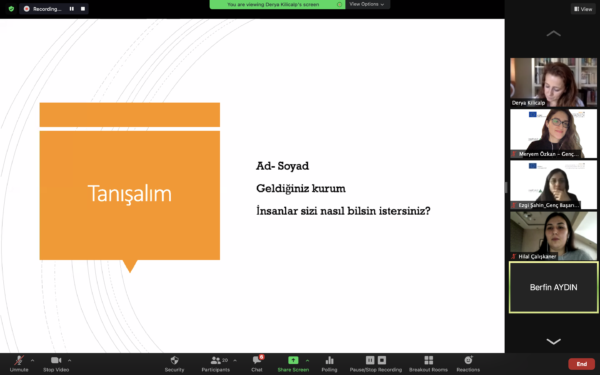The Capacity Building Training Sessions were organized by JA Turkey in December and held online due to the COVID-19 outbreak. The training sessions were in policy-making, advocacy, and fundraising to strengthen the CSOs active in the youth field and expand their network. Over 50 participants from CSOs attended the sessions. During the training period, theoretical and practical studies were implemented by the instructors, Derya Kilicalp and Hamit Levent Evci.

Training Instructors
The first instructor was Hamit Levent Evci, the capacity building expert of NGOs. He has a certificate in Human Rights Law and is currently doing a Master in Sociology. He has worked voluntarily and professionally in various NGOs for 13 years. He creates projects, conducts training sessions, and supports capacity building studies to contribute to a better life with nongovernmental organizations, local governments, the private sector, and international organizations. He continues to work as a consultant and instructor for strengthening disadvantaged groups and grassroots organizations, rights-based approach, monitoring and evaluation, and education. Another instructor was Derya Kilicalp, who has taken part in various levels in the private sector in her business life and started to work in the civil society sector in 2006. She was working as a project manager and corporate relations coordinator in NGOs, and organized many capacity-building workshops, contributed to the establishment and execution of strategic relationships with companies. She has undertaken the coordination of project activities and related teams on youth employment, entrepreneurship, health awareness, and the culture of peace. She is now an entrepreneur and continues her career as a consultant, instructor, and mentor in many projects.

Policy-making
The first training sessions were in policy-making for CSOs to support their policy processes to be more effective. On the first day, the Project was presented in detail, and the participants introduced themselves and their organisation. The session group consisted of mostly young professionals from the CSOs all around Turkey.
The sessions were interactively held, and the instructor showed the details of policy-making from the philosophy of it to the writing process and highlighted the significance of the CSOs’ policy. On the second and the last days, the participants were supported to analyze their own policy and compared it with other organisations in the NGO sector. They wrote their policy, developed new policy samples focused on youth studies, and presented.

Advocacy
On the advocacy training sessions, after the introduction to the Project and networking part, three groups worked together. Session groups consisted of young and experienced professionals made the activities more effective and productive.
The group studies showed how crucial the wording choices are for advocacy. The instructor, Derya Kilicalp explained the concept and the strategies to maintain a successful advocacy process. The next day, the participants selected their advocacy objectives and their perspective in light of their objectives with the suitable communication plans. Finally, successful advocacy examples about youth issues and entrepreneurship were presented and discussed in detail.

Fundraising
Fundraising training started with the networking session consisted of CSOs’ professionals. The instructor explained the types of fundraising through different examples from current projects. The participants shared their experience and criticized the strengths and weaknesses of the CSOs in the field of funding. Many fundraising tools, the crowdfunding platforms used in Turkey were discovered. It was shown how to develop fundraising strategies for the projects through intensive team works.
Four groups created their own campaigns and answered followed questions:
– What are their targets? Which tools will they use?
– What do they expect about the effects of their campaign?
– Where will they carry it out?
The groups presented their campaigns, and the development proposals were explained at the end of the training. The supporting documents were shared with the participants to explore the studies and reports about the NGO sector focused on youth and entrepreneurship. Further activities within the BY LEAP Project were explained and the participants had a shared interest in the Project.







